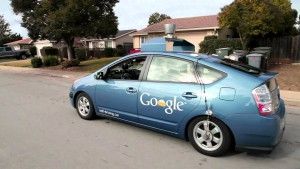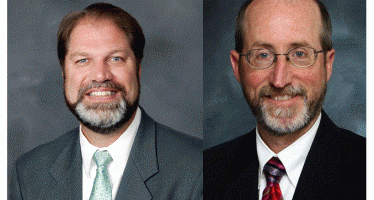CA tech doubles down on driverless cars
 Despite a spate of media attention surrounding a narrowly missed collision between two self-driving prototype vehicles, California companies fielding driverless cars forged ahead, insisting that the developing technology was safe and getting safer.
Despite a spate of media attention surrounding a narrowly missed collision between two self-driving prototype vehicles, California companies fielding driverless cars forged ahead, insisting that the developing technology was safe and getting safer.
An unexpected trial
Both cars in the incident “were equipped with similar technology, including lasers, radar, cameras and computer systems enabling the cars to drive on their own without need of human drivers,” noted the Washington Post, which added that both also put “people behind the wheel in case of an emergency.”
During the close shave in Palo Alto, the near-victim rode in an Audi Q5 equipped with Delphi Automotive’s self-driving system. “As the Delphi vehicle prepared to change lanes, a Google self-driving prototype — a Lexus RX400h crossover fitted with similar hardware and software — cut off the Audi, forcing it to abort the lane change,” Reuters reported.
“Both companies previously have reported minor collisions of self-driving cars with vehicles piloted by people. In most of those cases, the self-driving car was stopped, typically at an intersection, and was rear-ended by another vehicle,” according to Reuters. Significantly, however, as the wire service noted, neither the companies nor the California DMV has deemed any self-driving car to have been at fault.
Doubling down
Google, for one, took the episode in stride. At a recent shareholder meeting, cofounder Sergey Brin personally praised the driverless program. “I’m very proud of the record of our cars,” he said, as CIO reported. “We don’t claim cars are going to be perfect. Our goal is to beat human drivers, and nothing can be a perfect vehicle.” The company has nearly doubled its number of permits for self-driving cars, according to DMV records obtained by CIO:
“The additional 25 permits are for a new fleet of prototype cars that are undergoing testing on private roads, the company said. The cars, tiny two-seaters, are designed for neighborhood driving and have a top speed of 25 miles per hour.”
Now making their appearance on Mountain View area roads, the little autos “are still equipped with a steering wheel, accelerator pedal and brake pedal, and a qualified driver will be there to take over if things go awry,” as Discover pointed out. “The cars drive conservatively. For instance, their speed is capped at 25 miles per hour. And they pause 1.5 seconds after a stoplight turns green ‘because many accidents happen during this time.'”
Google has taken an early lead on California streets, with Mercedes and other companies rounding out the field. But competition could ramp up quickly. “In just 15 years, by 2030, the self-driving car market is expected to reach a whopping $87 billion, according to a recent report by Lux Research,” Business Insider observed. “That helps explain why, in addition to the tech giants Google and Uber, just about every car manufacturer is working on the technology.”
Dealing with humans
Ironically, tech companies have surmised, the most dangerous thing about driverless cars could well be the way humans drive around them. Self-driving vehicles lack the visual cues — such as telltale hesitation, communication, and, of course, a human driver inside — that we use to navigate through traffic situations and at intersections. Unless this challenge can be measured, analyzed, and effectively met, Google and other companies will struggle to secure regulatory support for stripping the cars down to the bare essentials.
In fact, Google’s fleet of slow-moving two-seaters was expressly designed to test human reactions to driverless cars on the road. “If all goes well, Google hopes to gain regulatory clearance to remove the steering wheel, brake pedal and emergency driver from the prototype,” according to US News. “Company executives have expressed hope that self-driving cars using its technology will be joining the flow of daily traffic by the end of this decade.”
Related Articles
CA incentives reel back film and TV production
Hollywood could soon reclaim its once-shaky status as America’s production headquarters. After a near panic touched off by a nationwide spending spree on
Federal board pushes high-speed rail – a little
Two recent events are keeping California’s high-speed rail project rumbling forward – either to eventual construction or wasteful oblivion. The
Special Election: Moorlach wins, Glazer advances to run-off for CA Senate
Two reformers, one a Republican the other a Democrat, won yesterday’s contested races for the California Senate. But the Democrat




